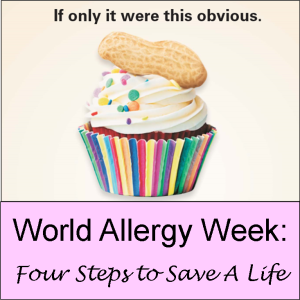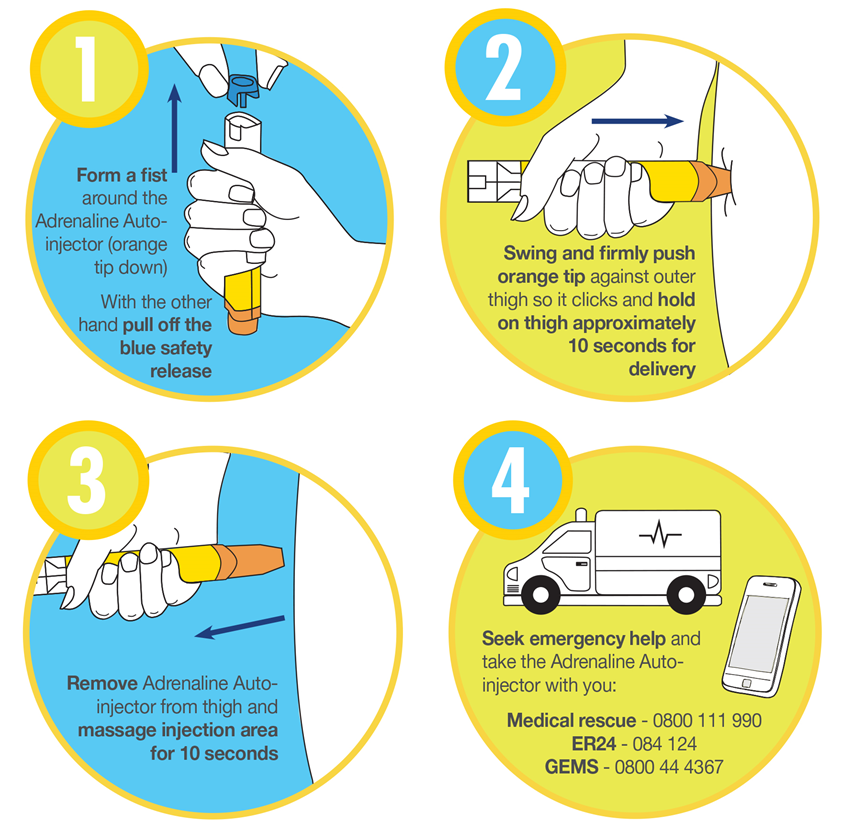 13-19 April is World Allergy Week and I found myself in the luxurious Fine Living in Parkmore to listen to some experts disseminate awareness of this condition. It was highly informative and good to hear some practical advice on how to recognize the signs of when allergies are at their worst (anaphylaxis) and what to do about it in four simple steps to save a life.
13-19 April is World Allergy Week and I found myself in the luxurious Fine Living in Parkmore to listen to some experts disseminate awareness of this condition. It was highly informative and good to hear some practical advice on how to recognize the signs of when allergies are at their worst (anaphylaxis) and what to do about it in four simple steps to save a life.
Dr Diane Hawarden is the chairman for the Allergy Society of South Africa (ALLSA) and seems to have a lot of practical experience in this field. She said that anyone, anytime anywhere is at risk. However, you are more at risk if you are an infant, adolescent (because of risky behavior – she referred to her own teen leaving her auto injector behind), pregnancy and the elderly. What also may make it worse is if you have aggravating existing conditions such as asthma, strenuous exercise, acute infections and emotional stress.
 The signs of anaphylaxis (which is a life threatening reaction to the allergy which can cause death either through the swelling of airways or a drop in blood pressure) can manifest in several ways – through the skin getting flushed, red and swollen, orally in the throat ( a horse voice means your throat is closing up), the chest, gastrointestinal and shock. You will see the signs within 5-30 minutes.
The signs of anaphylaxis (which is a life threatening reaction to the allergy which can cause death either through the swelling of airways or a drop in blood pressure) can manifest in several ways – through the skin getting flushed, red and swollen, orally in the throat ( a horse voice means your throat is closing up), the chest, gastrointestinal and shock. You will see the signs within 5-30 minutes.
Most noticeable, says Dr Hawarden, is this sense of impending doom. She talks about a doctor that was doing his rounds and felt dizzy and his throat closing up. He managed to yell to a nurse to inject him with adrenalin as he fainted. But he knew that there was something wrong. After the injection he was able to continue with his work. She says with kids the overriding feeling is of being scared.
The treatment for anaphylaxis is simple: it’s adrenalin. She emphasized that even if you aren’t sure if the problem is brought on by allergy, inject anyway, the sooner the better. The worst that can happen is the side effects of the adrenalin leave you feeling a bit light headed and you have to go to the pharmacy to get another injector. But why take the risk? Be safe.
The auto injector is the best because it has the exact dosage needed when you are in a panic, whereas with syringes and needles it takes time to get set up and release the correct amount.
Dr Hawarden gave a demonstration on how the auto injector worked. It is a container with blue on the one side and orange on the other. She told us the easy way to remember is to think of “blue to the sky, orange to your thigh”. So as long as the blue lid is on, it is closed but once you take it off it is ready to release the injection.
- Form a fist with one hand and pull of the blue safety release.
- Push the orange tip on your thigh. Wait for the click and hold it for ten seconds.
- Remove and massage the area for ten seconds.
- Call your emergency services/ go to the hospital as quickly as you can, taking your auto injector with you.
If you have a child with allergies it is important to make sure that all the care givers in his/her life are aware of the signs and what to do in the event of an allergy attack. Your child should also always take his auto injector with them wherever they go.
Hayley Katz is the founder of a patient advocacy group called Allergy Alive and also has a six year old son who has multiple allergies. She is doing a lot of work behind the scenes to make sure that labeling of food products is helpful for those with allergies. We were each given a sweet bar from Caring Candies which has “no artificial ingredients, no glycemic carbs, diabetes friendly, sugar free”. On the back under the list of the ingredients was ALLERGENS: May contain traces of tree nuts and soy beans through cross contamination of suppliers equipment.” This is the point that she made: even if there are e.g. nuts in the factory, it could affect the product.
Hayley is a clinical social worker and studying to be a psychoanalyst, so she naturally has an interest in the psychological effect of allergies. She cites cases of bullying and stress on the family when they have to manage a child with allergies. Often the siblings will act up in order to obtain attention.
I was interested to hear that there is also a children’s book in the works.
The last speaker was Emma Quilding, a fifteen year old teenager who lives in Parkmore, Sandton. What a mature girl with such a positive attitude. She has been standing up for herself since she was five years old and was offered a peanut butter sandwich and had to say no.
She told her story about her one experience with anaphylaxis which was when she ate a peanut butter muffin at school. In retrospect she says she should have injected right away, instead they waited to find the nurse who was busy elsewhere at the time. She said as the nurse drove her to hospital it felt like there was a weight on her chest and her hands were shaking. They were phoning her poor mom the whole time to reassure her that she could breathe. She spent a night at the hospital.
Emma is not letting her allergies hold her back and is off on a trip to Vietnam, which apparently has a lot of nuts! However she will be doing a lot of hiking and cooking her own food. She is also getting prepared with how to say “Does this contain nuts?” in Vietnamese, as well as with flashcards and multiple injectors.
The aim of this allergy week is to create awareness, so please share this information – it may just save a life.


Thank you for sharing this, Fjord is allergic to eggs, tree nuts, peanuts and a list of other things. The nuts are the most dangerous, when we first discovered his allergies I was paralysed with fear, it felt like he was walking around with a loaded gun but knowledge is power
Wow Sula I had no idea, you should have come with me to the talk!
Wow, this auto injector looks like quite a handy tool to have.
Aiden is allergic to Honey, and now seems to be developing allergies to scented creams and sun tan lotion aswell.
Other than a lengthy hospital stay last year from the honey allergy, we have thankfully had no other episodes.
Maybe I should consider getting one incase.
Yes I think you should. Sorry about the hospital stay, that must have been awful.